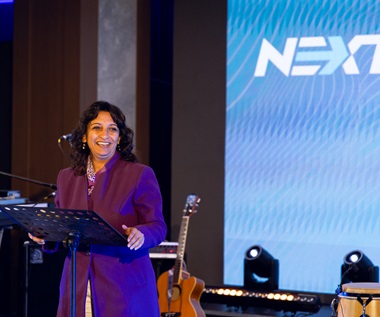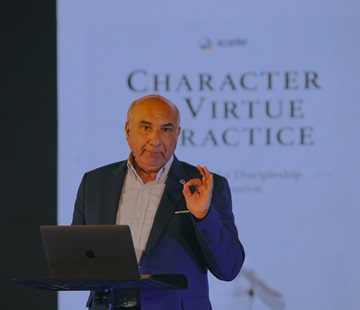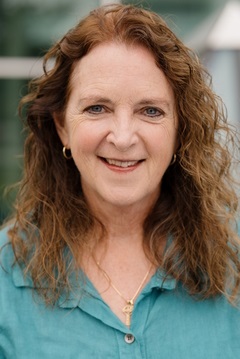
Anne Zaki, an Egyptian professor, psychologist and church leader, urged participants to rest, reflect and recalibrate. (ICETE Facebook)
“Remember that you are dust, and to dust you shall return.”
These sacred words were especially poignant when uttered by a Christian from Ukraine, smearing my forehead with the sign of the cross in ash and oil. We were reminded that this Ash Wednesday ritual, marking humility and penance, originated in the early church.
And here we were in 2025 in Albania, honoring the same solemn rite, with the collar-clad minister silhouetted against upward swirling shafts of dry-ice smoke on the stage of the worship band.
The liturgy continued with Scriptures read in Amharic by an Ethiopian woman and in Arabic by a Palestinian Israeli man, a profound meditation by a minister from Lebanon, a litany of penitence led by a woman from the USA, the imposition of ashes by ushers from Argentina, Lebanon, Syria and Ukraine, and a benediction in Chinese by a Singaporean.
It was certainly the most meaningful Ash Wednesday service I have engaged in.
The occasion was the triannual conference of the International Council for Evangelical Theological Education (ICETE). Over 600 participants from around the world gathered to deliberate on the theme, “Next for Theological Education,” whether formal, non-formal or informal.
Onufri, a renowned 16th century Albanian iconographer: ‘Presentation of Jesus in the Temple’ (Onufri National Museum, Berat, Albania)
In a highly interactive process throughout the conference, participants together envisioned “theological education that is accessible, relational, transformational, missional, church-centred, globally connected and biblically faithful.”
Impact Teams formed a crucial initiative in this year’s gathering. Prior to the conference, participants proposed key issues in theological education in need of address, with others signing up to join them for collaborative conversations before, during and following the conference.
Around 20 teams formed to engage with longstanding issues like Context-Rooted Curricular Engagement, Financial Sustainability and Women Thriving, as well as more recent developments in Confronting and Preventing Sexual Abuse, Competency-Based Theological Education, Polycentric Training for Mission and Technology and Innovation in Learning.
With my interest in global expressions of Christian spirituality, I joined the Impact Team on Character and Virtue in Theological Education. This approach was new to me and I learned a great deal from the able facilitator, Marvin Oxenham, and through engaging with the team.
A central thrust was to consider biblical teaching on virtue in relation to that of other cultures, both ancient and modern, particularly Aristotelian thought and virtue ethics.
Oxenham summed up:
Educationally, it helps to have a distinct focus on character and virtue that interfaces with the dynamics of our new life in God, with working out our being transformed by the Spirit, and with how we can be intentionally formed to be Christlike in our character.
The contemporary relevance of this subject could not be more pressing, given the flagrant lack of virtue demonstrated in the content of our daily doomscrolling.
As much as I valued these deliberations within the Impact Team, I was far more impacted by my one-on-one conversations with remarkable participants, old and new friends, who clearly embody Christlike character within very trying situations.
Yohanna Katanacho, a Palestinian Israeli biblical scholar from Nazareth, humbled me in our discussion of the war in Gaza and challenged me in my own response, as a Canadian Christian, to leaders and developments south of our border.
Ruth Padilla DeBorst, a Latin American theologian, inspired me by her tenacity in fostering integral mission, both in her local community of Casa Adobe in San Jose, Costa Rica, and globally, despite opposition from certain quarters of Western evangelicalism.

Lebanese Bible scholar Riad Kassis attended Regent College in the 1990s. (ICETE Facebook)
Nancy Njagi, a longtime activist and educator in Kibera, one of the largest informal settlements (slums) in Nairobi, Kenya, invigorated me with the developments in holistic gospel ministry within this challenging context.
Theresa Lua, former Dean of the Asia School of Theology in the Philippines and now General Secretary of the Asia Theological Association, kindly invited me into conversations and conferences that she and her colleagues are holding on Asian women’s experience of Christian spirituality.
And Riad Kassis, a Lebanese biblical scholar and minister who was my fellow student at Regent College in the early 1990s, impressed me by his visionary leadership within global theological education as former International Director of ICETE and now as International Director of Langham Partnership.
I was profoundly moved by Anne Zaki, an Egyptian professor, psychologist and church leader who, in personal conversation and in her daily preaching, radiated the love of Christ.
From 2 Samuel 9, with King David restoring Saul’s land to Jonathan’s lame son Mephibosheth and inviting him to eat always at his table with him, Zaki encouraged us to rest in Christ’s gracious provision of a banqueting table, despite our own brokenness.
From 1 Chronicles 17, when God refused King David’s request to build him a house and David “went in and sat before the Lord” (v. 16), Zaki urged us to regularly reflect on God in relation to our unfulfilled dreams and plans – not only to think about but to mirror God’s character to others in any of our circumstances. “Formation happens,” she said, “as we wait for our unfulfilled callings. . . .”
And from 1 Chronicles 15, with David’s second attempt to carry the ark of God to Jerusalem, following the death of Uzzah, Zaki called us to recalibrate not only our sense of God’s mission, to ensure it aligns with God’s intent for us, but also our methods in seeking to fulfill this mission in our own contexts today.

Diane Stinton
Rest. Reflect. Recalibrate. Clearly God’s generous invitation and loving desire for each one of us, as we acknowledge our own brokenness and healing, wait with our unfulfilled dreams and seek to align ourselves with God’s personal and unique mission for each one of us.
Diane Stinton is Associate Professor of Mission Studies and World Christianity and Dean of Students at Regent College. She specializes in the study of world Christianity, particularly in theological developments in the global South.
She has posted this comment on this site as a member of The Bell: Diverse Christian Voices in Vancouver. Go here to see earlier comments in the series.
